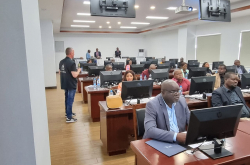Timeframe: 2023 - 2025
Budget: EUR 8.8 million
Donor: German Federal Foreign Office
The situation
West Africa and the Sahel face growing terrorist threats from transnational groups and local extremist organizations. This can be explained by several factors, including regional instabilities, and porous borders.
While Sahelian member countries have faced terrorist threats for years, member countries in the Gulf of Guinea have increasingly suffered from terrorist incidents and related violence.
The development of terrorist networks in the region is a source of concern for member countries, as well as for the international community. Terrorism is a complex phenomenon and countering it requires a holistic and cross-border response.
Project aims
The overall objective of I-CT SHIELD is to enhance the operational capabilities of member countries to effectively counter terrorist threats and investigate attacks.
The Project will ensure effective use of INTERPOL policing capabilities by national law enforcement agencies, relevant specialized units and border authorities. It will do this by:
- Promoting the use of biometrics to prevent, detect, and combat terrorism;
- Encouraging the use of battlefield information to counter-terrorism;
- Strengthening physical and virtual borders;
- Enhancing criminal intelligence analysis capabilities related to terrorism;
- Increasing counter-terrorism investigative and operational cooperation at country and regional levels;
- Facilitating information exchange and access to data related to terrorism.
Project activities
We will support member countries in their counter-terrorism efforts by:
- Providing training on Crime Scene Investigation (CSI) of terrorist attacks;
- Building capacities to enhance border security in the region;
- Organizing Criminal Intelligence Analysis training sessions and mentoring activities to combat terrorism;
- Providing counter-terrorism operational support;
- Promoting intelligence-sharing around terrorist networks and trends.
Supporting our global counter-terrorism strategy, the project focuses on the following beneficiary countries: Benin, Burkina Faso, Côte d’Ivoire, Ghana, Mali, Niger, and Togo.
Related documents

Related news

Border security threats focus of STOP operations in Africa
8 December 2023







